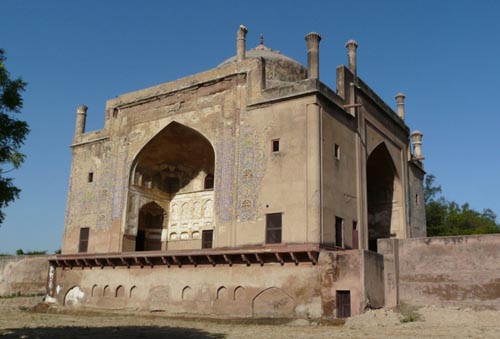Afzal Khan's Cenotaph

Information on Afzal Khan's Cenotaph (Bangalore, Karnataka) - History & Architecture
Afzal Khan's Cenotaphs is regarded as an amazing monument of Indian history. It is situated in Bijapur of Karnataka and is believed that Afzal Khan initiated the structure of his own catacomb throughout his life span. However, at the end, Afzal Khan himself could not be buried there. Significant historical story is related with this monument which makes this place highly important for the purpose of travelling.
Afzal Khan's Cenotaph Architecture
Afzal Khan's Cenotaphs is situated in about two and half mile distance from Shahpur entrance. There are big brickwork stage in the cenotaphs. The cenotaphs are designed with eleven rows of tombs which added up to 64 burials of Afzal Khan's wives. Afzal Khan had executed all of his wives before going on an assembly in order to defeat and terminate Chatrapati Shivaji. The reason for conducting such a nasty act was due to the prophecy of an astrologer that he will not return from the meeting with Shivaji. Thus, by killing his wives, he ensured that they do not engage in remarriage after his demise. He had created a well, took his wives and pushed them in the well one by one. Near the tombs, the old well can be observed which is supposed to have met the catastrophic end of Afzal Khan's wives. Nevertheless, it was also believed that one of his wives have successfully escaped from the well. It was said that the 61th wife of Afzal Khan, namely Khatija Begam evaded from the well and ran away to a nearby village. Thus, in Afzal Khan's Cenotaphs, one empty tomb can be observed. Nevertheless, at the end, she was captured and killed eventually in that village which is later named according to her wife, i.e. Khatijapur.
Afzal Khan's Cenotaph History
Afzal Khan was an Indian leader who aided Adishahi family and ruled Bijapur and battled against Shivaji. His unwavering talents and authoritative skills helped to generate high popularity. Legend says that he was bestowed an eminent sword, termed as 'Adili', which was covered with diamonds. When Shivaji challenged Adilshahi's sovereignty, Afzal Khan undertaken the act of conquering him. In the year 1659, he prepared a military force of about 10000 troops and chased Shivaji determinedly. By facing significant losses, the forces of Shivaji compelled to take shelter in a hill fort. In order to make Shivaji to come out from hiding, Afzal Khan defiled the holy places of Hindu. After recognising the strength of Afzal Khan in plains, Shivaji shifted to Pratapgad Fort, which was covered with dark forest, Shivaji's forces outshined in this type of land, making Afzal Khan's army ineffectual. By comprehending that the subsequent battle would lead to enormous fatalities to both parties, it ultimately resulted in fatal stand-off. Hence, Afzal Khan sent out envoys to Shivaji in order to trap him from Pratapgad Fort and to convey peace. However, it was believed that the peace-making initiative of Afzal Khan was just a decoy for defeating Shivaji. Afterwards, in a meeting with Shivaji, Afzal Khan was killed and his forces were also crushed in the 'battle of Pratapgad'.
Afzal Khan's Cenotaph Tourism Importance
Due to its unique historical significance, Afzal Khan's Cenotaphs is worth visiting. It is one of the most popular places in Karnataka. Vising the cenotaphs can bring about the old horrible memories of the past regarding such brutal act of Afzal Khan.
- Bangalore Monuments
- Bagalkot Monuments
- Belgaum Monuments
- Bellary Monuments
- Bidar Monuments
- Bijapur Monuments
- Chitradurga Monuments
- Coorg Monuments
- Dakshina Kannada Monuments
- Gadag Monuments
- Gulbarga Monuments
- Hassan Monuments
- Mysore Monuments
- Raichur Monuments
- Uttara Kannada Monuments
- Yadgir Monuments
- Andaman Nicobar Monuments
- Andhra Pradesh Monuments
- Assam Monuments
- Bihar Monuments
- Chhattisgarh Monuments
- New Delhi Monuments
- Goa Monuments
- Gujarat Monuments
- Haryana Monuments
- Himachal Pradesh Monuments
- Jammu and Kashmir Monuments
- Karnataka Monuments
- Kerala Monuments
- Madhya Pradesh Monuments
- Maharashtra Monuments
- Odisha Monuments
- Punjab Monuments
- Rajasthan Monuments
- Tamil Nadu Monuments
- Telangana Monuments
- Uttar Pradesh Monuments
- West Bengal Monuments